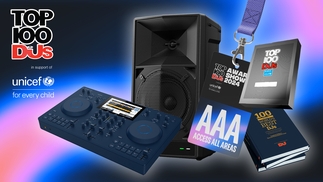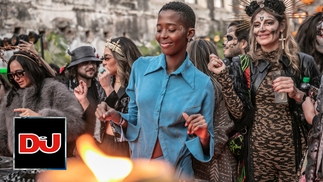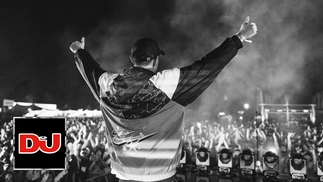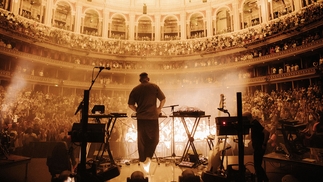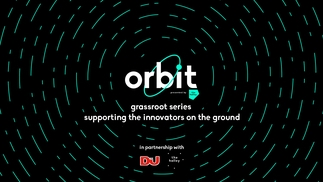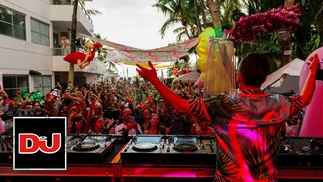Porter Robinson: DJ Mag North America cover feature
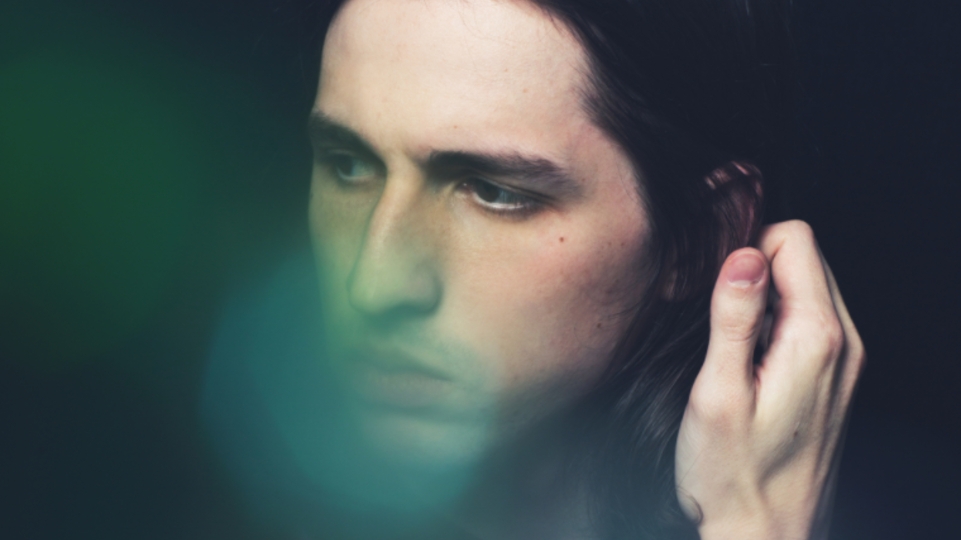
The evolution of Porter Robinson has been filled with constant transformations throughout the years. The beloved producer once again abandons the sounds that made him a global star to become Virtual Self...
Porter Robinson opens his mouth and words come pouring out at a mile a minute. When the North Carolina wunderkind is excited, like he is right at this moment, his voice jumps to a speed a few 100 times that. The DJ/producer is notoriously precise – a trait that does not transfer into his currently heightened state of rambling. There’s a certain magnetism – perhaps it’s the whole Southern charm – to the way he often stumbles on his words, while completely losing his train of thought and going on long tangents for minutes on end at other times. It’s apparent his yap can barely keep up with his supercomputer-like brain, as the words keep escaping his lips miles behind the thoughts whence they were born.
It’s a freezing afternoon in early December. We’re sitting in the back of a restaurant, a closed-off section exclusive only to Porter and DJ Mag, in a swanky boutique luxury hotel in Williamsburg. Porter, dressed head to toe in chic streetwear, a fly-as-fuck hoodie and a pair of drool-worthy kicks that’ll make any sneakerhead envious, is enjoying a rare few hours of downtime here, ahead of what seems like an impossibly packed schedule for the night. He got into NYC the prior evening, and in a few hours time, he and his team of managers, road crew, and lighting hands, plus his pint-sized girlfriend who flew in from Hawaii early this morning, are heading to a dirty, dingy massive warehouse in south Brooklyn for a sound check and some last-minute edits.
Sitting in his chair at full attention, Porter leans into the table every time he wants to make a point across, as if there were a giant valley separating us; it’s his way of making sure you’re paying attention to what he has to say. His hands, too, are speaking with intensity, waving to and fro the deeper he gets into the conversation. One seat across, he can practically peer into your soul with the way he looks you in the eyes. It’s almost intimidating, if he weren’t such a nice bloke.

Our table is bare – no time for food or drinks. There’s too much to cover in our short 30-minute sit-down to be bogged down by appetizers and pleasantries. There is a lot going on within Porter’s tiny frame and busy mind right now: his set list for tonight; a new visual show; never-before-used production; the friends, family and extended fans he’s expecting at the gig. Thoughts enter and exit his head before he can even comprehend them properly. Still even amidst his relentless barrage of ideas, and the occasional word vomit, he’s fully focused on our conversation, rarely breaking eye contact as he carefully explains the minute details behind his newest project.
“It’s my first time talking about this stuff — ever,” says Porter, with an ear-to-ear grin. Later this evening, at the Brooklyn warehouse, it’ll be his first time performing all “this stuff,” too.
DJ Mag is intrigued.
To say it will be a big night for Porter is to understate what lies ahead. Tonight, the musician explores new sonic territories. Tonight, Porter lifts the veil on a new image, a new brand, a new vision. Tonight, Porter puts it all on the line and steps into the unknown. Tonight, Porter Robinson becomes Virtual Self.
THE OLD SOUND
Hearing Porter explain the history and inspiration behind his newly launched Virtual Self project is like listening to your parent’s harking back to the good-ol’ days. As he tells it, Virtual Self is deeply rooted in nostalgia, which is surprising to hear from someone so young. At the tender age of 25, Porter is already looking back wistfully to his youth.
“I’ve been thinking nostalgically since I was 15,” jokes Porter. “The last body of work I did was extremely nostalgic. ‘Worlds’ [his 2014 breakthrough album] was all about video game nostalgia. But also, [Virtual Self is] not necessarily about my own personal nostalgia. It’s just that eras tend to come back.”
He’s right. In music, trends come and go in cycles, often in 10-, 15-, 20-year successions. The disco sounds of the ‘70s became house music and techno in the ‘80s, which begat the electronica boom of the ‘90s, which eventually gave birth to what we know today as EDM.
For Virtual Self, however, the nostalgia factor lives in one specific period: 1999-2003, a time Porter recognizes as the “golden era of trance.” And it was from this and only this era where Porter pulled his musical cues for the Virtual Self visual and audio canon. He spent the better half of a year digitally digging through Beatport and other online retail stores and listening to every single trance, drum & bass, jungle and techno track released in those years, endlessly on the hunt for a very particular sound.
“As time goes by, you can start to appreciate what makes a given era distinct,” explains Porter. “I think it just requires a little bit of distance and space in order to appreciate the things that make a given area distinctive. [With Virtual Self,] I want to help us define how we remember the early 2000s. I want to help revitalize and bring those things to the forefront. I want to be one of the people who defines nostalgia for that time period.”
The preciseness in Porter’s reference points is no accident, either. That exact timeframe holds a very special place in his heart: The songs and sonic styles released between 1999-2003 embody the time when he first discovered electronic music via rhythm games like Dance Dance Revolution and Beatmania, a charming anecdote now part of Porter Robinson lore. It’s the main reason why Virtual Self music often sounds like the soundtrack to childhood memories for fans of a certain age. Nostalgia, it seems, always wins.
THE NEW SOUND
Announced on Porter’s official Twitter page, under the banner “NEW PROJECT,” Virtual Self came to life in late October last year via the debut single ‘Eon Break’. And to this day, die-hard Porter fans, avid music bloggers and social media hounds are still trying to piece the puzzle together: Who, or what, exactly is Virtual Self?
Online, the answers are no clearer. The official Virtual Self website is a looping wormhole full of interactive digital art and cryptic, somewhat ominous messages: “Is the joyful-Layer complete?” “Am I convinced of nothingness?” “As the sacred dust transpires, what will you become?”
The website is flanked by two angel-like figures: Pathselector, dressed in a long, all-white gown and gold mask, and technic-Angel, a pale female character in a thick, black hooded cape. On social media, both Pathselector and technic-Angel, an ostensible pair of yin and yang “personalities,” have their own Twitter pages, and each is tied back to Porter Robinson.
The entire experience, as cool and weird as it plays out online, all points to one element: the music of Virtual Self, Porter’s latest creative venture that’s expanding the beloved producer’s sonic realm and challenging the notion of modern electronic pop head-on.

At first listen, ‘Eon Break’, the debut song credited to Virtual Self, is many things all at once: confusing, challenging, frantic, cryptic, bold, bombastic, unique. The official music video further intensifies the track’s dexterity, with beautiful images of abstract 3D art and mysterious messages flooding the screen. The tune ebbs and flows through many a genre, from the speed-freak levels of Eurodance, the brutal force of old-school hardcore and ‘90s rave, the digital dreamscape vibes of retro video game music and the cold atmospherics of classic and hard trance.
Porter’s self-titled debut EP as Virtual Self, released in November of last year, continues to burrow through this hodgepodge of sounds and styles, absorbing even more genre elements here (drum & bass and hardstyle on ‘Eon Break’), there (future house on ‘Ghost Voices’) and everywhere (happy hardcore on ‘Particle Arts’). When it’s all combined and contorted together, we get a brand of kinetic neotrance rooted in history, but updated for the digital future.
‘Virtual Self’ leaves virtually no genre untouched. More importantly, it marks a drastic shift in the Porter Robinson timeline and sees him breaking away from the electronic pop that has largely defined his sound. Simply put, ‘Virtual Self’ is from a different planet from whence came ‘Worlds’, the debut album that catapulted him into stardom and set him on an artistic path all his own.

THE PATH TO VIRTUAL SELF
When Porter released ‘Worlds’ in 2014, it manifested a sea change for both the producer and the larger electronic music industry. On a personal level, ‘Worlds’ marked Porter’s departure from his earlier days as the boy-king of electro and complextro, styles that defined him at the time of his 2010 hit ‘Say My Name’ and his 2011 ‘Spitfire’ EP. Gone were the days of aggressive, bass-in-your-face brostep and heavy electro bangers, forever replaced by the lush, cinematic and immersive soundscapes of alternative electronic pop heard all throughout ‘Worlds’. On a wider scale, Porter and ‘Worlds’ helped usher in a welcoming environment for softer, dreamier electronic music and opened the doors for his contemporaries and underlings like ODESZA, Jai Wolf, Illenium and Giraffage today.
But for as much of a springboard ‘Worlds’ created, it, too, had its pitfalls.
“In 2015, in particular, [it] was a very difficult year for me, because ‘Worlds’ had just come out in 2014 and people were loving it and I was touring the live show,” says Porter. “And I was trying to figure out what to do next and I was under a lot of pressure to do something akin to a follow-up. And yet, when I got in the studio to do exactly that, it just wasn’t inspiring and it wasn’t as good.”
That same year, he fell into depression and battled severe bouts of self-doubt, an episode he publicly addressed on Twitter at the beginning of last year. “It’s always a battle, but I think I’ve made some pretty big steps and made some progress in terms of taking care of myself and my mental health,” he says today.
These days, Porter is ready to admit how much of a paralyzing blow he experienced creatively after ‘Worlds’. He claims to have a hundred demos of unreleased music he produced in 2015 in a follow-up to ‘Worlds’. He recently listened to all of them.
“That is the music of a person who was depressed and uninspired and scared and unhappy,” he openly admits of the demos. “Then I started getting little hints of what I was going to do next in 2016. And I just started figuring out what the next Porter thing was going to be and then,” he slams the table hard with an open hand, “Virtual Self!”
It all clicks in an instant: the reason why Porter has been speaking at breakneck speeds this entire time; the feelings of nervousness about tonight’s big show. Porter Robinson has been mutely sitting on Virtual Self for the last two years, anxiously waiting for this exact moment to publicly speak about his passion project and eagerly anticipating showing it to the world.
PORTER ROBINSON VS. VIRTUAL SELF
At the end of last December, exactly three weeks after his debut show as Virtual Self in that same Brooklyn warehouse, Porter draws a figurative line on Twitter: “no virtual self music at porter shows, no porter music at virtual self shows! eveeeeeerrrrrrrrr.”
It’s a divisive message that pits fans on either side of the spectrum. But for him, the distinction between the two identities is do or die, a separation of the Church of Porter Robinson and the state of Virtual Self.
“In a way, I don’t necessarily see Virtual Self as being the next part of the Porter Robinson thing,” he says. “I want it to live in its own world here. The future of Porter, I know what it is; I’ve been working on that for a really long time. But I needed to do this. I needed to get Virtual Self out there.”
It’s a bold approach, indeed. But the idea of Virtual Self alone is a daring move. If ‘Worlds’ was Porter’s departure from the EDM ranks, then Virtual Self is his declaration of independence, his manifesto for anarchy, his proclamation for something new. With Virtual Self, he’s abandoning the sound that’s made him a bona fide global star adored by millions of fans worldwide. Whether his fans will accept Virtual Self, however, is another question, and the thought of losing followers along the way is not lost on Porter. In fact, he’s counting on it.
“Virtual Self is the furthest thing from an attempt to please my fans or make what they want,” he proclaims. “I wanted Virtual Self to be something that a good chunk of Porter fans might reject. That’s a sign of success. I feel like if I did something that was popular amongst every single person who follows me, then I must have compromised along the way somehow. I don’t want anyone to have to force themselves to try to be a part of it. I want this to be for people who love it as much as I do.”
THE CRITIC AND THE ADVOCATE
Throughout the years, Porter has brazenly expressed his frustrations with the EDM world and has denounced the genre on more than one occasion. He took shots at dance music in the ‘Worlds’ track ‘Fellow Feeling’, in which he exposed the supposed “EDM formula” and destroyed it: Following a bellicose, glitched-out electro beat that crashes and burns in seconds, a soft voice explains, “This ugliness, this cruelty, this repulsiveness, it will all die out.” It’s an allegorical takedown of an entire industry in song form.
While Porter is often portrayed as a sort of habitual curmudgeon in the music press and blogosphere, he retains that all the seemingly harsh criticisms come from a place of positivity, not malice. And when he sees his precious scene dominated by what he calls “homogenized” sounds, he speaks out. These days, he’s taking matters into his own hands via Virtual Self.
“I want to inspire two things [with Virtual Self],” says Porter. “One is for hopefully some other artists in the more visible scene, people who are already doing well, to use their platform and resources to try to mix things up. And the other is for people who are following me who have maybe only listened to future bass or whatever for the last three years, that they might expand their horizons a little bit and they might want to dig deeper into other artists.”
A VIRTUAL FUTURE
Virtual Self is the latest incarnation in a long line of transformations for Porter. A trip down the way-back machine reveals the many sides of the Porter Robinson gamut: high-energy hands up as Ekowraith from his teenage days; aggressive electro as Antigon Moore and under his birth name at the end of the aughts; the melodic progressive house and alternative electronic of fan-favorite singles ‘Language’ (2012) and ‘Easy’ with Mat Zo (2013); the kaleidoscopic sonic breadth of ‘Worlds’; and the future-forward aesthetic of ‘Shelter’ (2016) with BFF Madeon. Watching Porter evolve as an artist is like watching your little brother going through his many phases, some awkward, some good, some weird, some... questionable.
But now with Virtual Self, the future for Porter is an open sea of possibility.
“Virtual Self was one of those things that felt like pure inspiration. There wasn’t a whole lot of figuring out what I wanted it to be like. I knew what I was going for instantaneously; there was no fumbling around. The way that it looks and the way that it sounds is exactly how I was intending, which is maybe the first time I’ve ever felt about a project,” he says, proudly.
THE VIRTUAL COMES TO LIFE
When DJ Mag finally makes it to the Brooklyn warehouse on that fateful December night, the air is thick in anticipation and mystery. The crowd, made up of mostly young ravers looking to rage their faces off and to renounce all inhibitions on the dancefloor just for one night, anxiously waits for Porter to take the stage. They are desperate for even just a glimpse of what’s to come. Backstage, Porter is pacing around the makeshift green room in this dilapidating warehouse as a circus of industry insiders and hangers-on pay little attention to the restless artist. His face, serious and focused, rarely breaks a smile.
Just after 1am, the massive warehouse goes pitch-black dark. A distorted voice blasts through the speakers, communicating cryptic claptrap to a confused audience. A seizure-inducing tidal wave of flashing bright lights explodes from the stage as pillars of white light build a fortress around the mysterious figure behind the DJ decks. Porter is dressed in a cyber-vampire cloak that’s blacker than midnight, his small frame barely visible behind all the mania happening both on and off the stage. The word “utopia” flashes on the mega-sized LED screen, and a grenade of green lasers explodes onto the crowd. We all collectively lose our shit.
For two straight hours, Porter transports us into a far-off dimension of colors, lasers and BPM, unleashing a ferocious fusillade of hardcore, hard dance and future techno in between beautiful interludes of ethereal neotrance. The crowd reacts in blissed-out unison, despite having little notion of the noise resonating from the tower of speakers. It’s clear he’s having massive fun onstage.

At the end of the night, prior to his encore, Porter reluctantly hops on the microphone, as the crowd howls at the immediate sound of his voice. He’s once again speaking a mile a minute, thinking and feeling a million things all at once. “You guys,” he pauses, “I didn’t really plan on saying anything on the microphone ever as Virtual Self, but this was so special to me. For the last two years, I’ve been wanting to play all this music. This has been a really, really long time coming. It’s my favorite thing in the world.”
DJ Mag rings Porter a few days after Christmas. He’s back home in North Carolina, enjoying the holidays with his family before he heads back on the road for a few days worth of New Year’s Eve performances. And already, he’s longing that momentous night.
“It’s really hard for me to process. There are a lot of times where it’ll occur to me that Virtual Self is out and that I’ve played the first show for it,” he says, having flashbacks as nostalgia knocks again. “And it doesn’t really feel right to me, it doesn’t feel true. It was something that I anticipated so much for so long, it still feels like it’s on the horizon for me somehow.”
What is officially on the horizon, though, is nothing short of impressive including major slots at Ultra Music Festival, Bonnaroo and Buku this festival season. There are even rumors of a Virtual Self video game and animation series floating around the internet. He denies it all.
The future is uncertain for Virtual Self, but it sounds damn good. For now, Porter Robinson is basking in a newfound sense of freedom that’s been missing in his life for years—freedom to think, freedom to experiment, freedom to create, freedom to be.
The wild chatter dims and Virtual Self is finally born.


